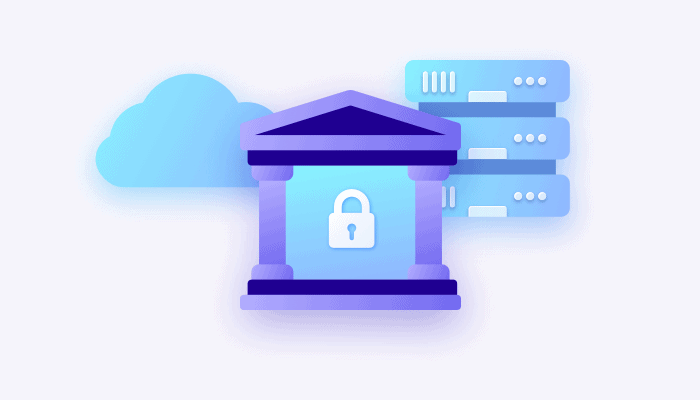
Compared to other industries, banking is known to be slow in adopting new technologies. The banking and finance industry is one of the oldest, and traditional institutions have been using established practices and legacy technologies for decades.
Why is it so? The largest concern that banks have in implementing advanced technological solutions is security. Today, nine times out of ten, a new solution is related to information technologies and cyberspace. And whenever you set foot in cyberspace, you need to beware of cybercriminals who are after two things – money and information. The banking sector handles both.
Concerns about security threats prevent many companies from hosting their data in the cloud – as many as 57% admit this. For the same reason, banks preferred to conduct their business in on-premise infrastructures committing to protect their customer’s extremely sensitive information.
However, as cloud technologies become more advanced and security mechanisms and algorithms have evolved to the level where they can be trusted with even the most sensitive data, the banking sector is beginning to join the digital transformation by adopting the cloud as its infrastructure. However, as usual, there are advantages and things to watch out for.
Which benefits can cloud computing bring to banks?
When a bank is considering switching to cloud infrastructure, there are the following key benefits to pay attention to.
Streamlining multi-channel communication
As early as 2017, 65% of customers already communicated with banks via multiple channels, often switching from one to another. Responding to their customers’ demand, banks have started to offer a variety of communication channels in an attempt to provide as convenient a communication environment as possible. You can now reach out to a bank via email, live chat, social media, and a mobile application.
Naturally, with information coming in via multiple channels, banks can be quickly swamped with the amount of data that needs to be processed and stored. In this context, cloud computing is an optimal storage solution. In a cloud, a banking institution can get virtually unlimited storage receiving data coming from multiple sources.
Cloud computing can also resolve the problem of customers switching channels. For example, a customer might start communicating with the bank via the call center and then continue in a live chat. For the support team, it will be easier to resolve the issue when all data is stored centrally and can be accessed regardless of the communication channel used.
Here, however, the concern of communication security may be a show-stopper. Can you be sure that the channel and data storage are secure enough? How can you guarantee the protection of data when cloud storages are used? Luckily, cloud computing technology has evolved enough to provide sufficient security even for banking applications, and they can offer secure messaging or live chat to their customers.
Scalability and global presence
The banking industry, like any other, is being influenced by the globalization trend. Banks are no longer single standalone institutions serving a limited number of local customers. Rather, they are becoming wide networks opening branches and offices in multiple countries across continents.
In this context, cloud resources fit the purpose perfectly. For a client, they are effectively unlimited and can be scaled up and down as necessary. When the infrastructure is hosted in a cloud, deploying a new branch becomes much easier than with physical on-premise solutions.
Additional cloud capacities can be deployed quickly and seamlessly. Most cloud providers have global networks with multiple data centers strategically placed in different countries to ensure reliable coverage, sufficient redundancy, strong physical protection, and the adequate level of security. The bank setting up a new branch or office needs to select the cloud computing region that serves the required area and request the resources needed to start the business.
Cost-effectiveness
Cloud computing, as opposed to on-premise infrastructure, allows banks to save on operational costs and to use the existing cost allocations much more efficiently. Of course, cloud hosting comes at a subscription cost, but it’s nowhere as high as the cost of maintaining physical infrastructure.
Deploying an on-premise banking network is a major investment. In addition to the initial costs of hardware and software needed to start a banking business, the institution also needs to provide for the ongoing maintenance, upgrades, electricity, cooling. And we have not yet mentioned the physical and cyber security measures required to ensure the protection of a banking institution.
In a cloud, most of these costs and measures have been taken care of by the cloud service provider. The hardware infrastructure is set up and being maintained in the provider’s data centers where cloud servers are installed. The provider also takes care of the security, both in the physical and cyberspace, taking the required measures to mitigate security risks. The client needs only to pay for the resources they consume.
Smooth integrations
Nowadays, any system, banking included, is a complex combination of multiple applications and tools, often developed by third parties. This is often the cause of banks’ reluctance to adopt new technologies – concerns about their business environments’ integration with advanced software.
In a cloud service, integrations with most of the major solutions are already implemented and tested. Cloud resources are usually offered as a set of services that can be selected as needed while staying assured that all the selected components will not conflict with each other.
A bank may, for example, benefit from choosing cloud-based CRM and communication tools with multiple built-in features, such as call logging, live chat, file sharing, etc. Besides, today development companies build their products with cloud hosting in mind creating ready cloud solutions. For example, QuickBlox’s communication solution is designed to run in a cloud, either your own or a public cloud of your choice.
Things to watch out for
Nothing is perfect, and with all the benefits of cloud computing, it should be adopted with care. Here are a couple of things that should be considered when making a decision about opting for cloud hosting.
Regulatory requirements
The banking industry is regulated to the maximum, and many of the applicable rules and restrictions apply to the way data is stored and managed. For example, certain regulations may require that data is only stored in a specific jurisdiction. This requirement can prevent a bank from switching to a cloud, as the required jurisdiction may have no cloud data centers.
However, the leading public cloud providers have almost complete coverage with multiple data centers. Therefore, it may be possible to enjoy the benefits of cloud computing while complying with the data residency requirements.
Vendor lock-in
It may happen, especially with very large volumes of data stored in a cloud environment, that switching to another cloud service provider becomes extremely difficult, if not impossible. Sometimes, the contract with the cloud service provider prevents it, too.
Vendor lock-in may, indeed, become a problem. To prevent it, pay attention to the contract with the cloud service provider, especially the termination conditions and the notice period. At the same time, make sure your data can be migrated smoothly, when needed. For example, avoid using proprietary formats for data storage and build portable applications where the core features do not depend on the services of a particular cloud provider.
Partnering with QuickBlox
If you are looking to add real-time communication functionality to your banking app or business website and are concerned about security, partner with Quickblox.
- QuickBlox provides a complete communication platform providing live chat, voice and video call and a host of other functionality all available through SDKs and APIs.
- We have a proven track record working with the financial industry and can support your security data needs and regulatory requirements offering data encryption and a range of additional security enhancements.
- We can host your data and chat history wherever you need it to be, including your own on-premise infrastructure, your own private cloud, or public cloud with your own preferred cloud hosting provider. We can also support a hybrid cloud solution.
Conclusion
The time has come for banks to start adopting cloud technologies. The benefits of cloud computing for the banking industry are obvious, however, in order to achieve the best performance and ensure data protection, the decision to migrate to a cloud should be based on thorough analysis and research. However, the improvement in performance and competitiveness will be worth the effort.
QuickBlox can provide expert consulting on implementing cloud-based solutions to enable communication for financial enterprises. Contact us to discuss your requirements, and we will be able to propose a solution that fits.






